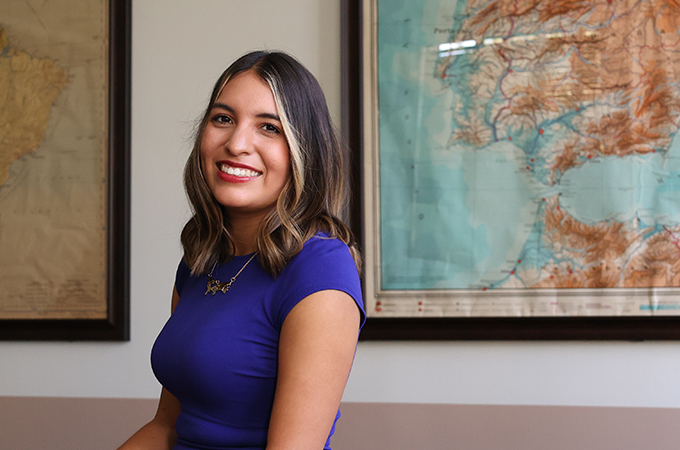When Kristen Sauceda ’20 stepped foot on the main Redlands campus as a first-year student, she aspired to be an educator, following in the footsteps of her favorite history teacher, Shannon Appenrodt ’97. But four years later, Sauceda’s horizons have expanded beyond the classroom and across borders, and she says that it’s all thanks to the University of Redlands.
On the day Sauceda graduated from the U of R, she was awarded a scholarship to be a Fulbright English teaching assistant at a high school in Madrid, Spain, where she built a Model United Nations (UN) program from the ground up. After she created lesson plans and coached her students on their way to the global conference, Sauceda received a second Fulbright grant to return as a global classrooms mentor. She now leads the program alongside her co-mentor, selecting debate topics and ironing out logistical processes for the 120 schools that compete in the program.
“I wasn’t a big risk-taker,” she says, remembering that every college she applied to was no more than an hour away from her hometown of La Habra, California. “But when I got to Redlands, I was confronted with a mass of possibilities. I was open to opportunities and took risks, and it really paid off.”
Being a part of history
When it comes to experiential learning, recent years have provided an interesting environment to be a political science and public policy student. Two months after Sauceda arrived at Redlands, she sat with her classmates and watched live coverage of the 2016 presidential election, which was required for her first-year seminar course with Professor and Ken and Lynn Hall Chair in Public Policy Greg Thorson.
As Sauceda and her classmates spent the semester analyzing and discussing the election and its results, she connected her passion for history with optimism for the future, declaring a double major in political science and public policy with a minor in history.
After taking courses on United States government and constitutional law, Sauceda studied abroad in Germany amidst the United Kingdom’s discussions about leaving the European Union. As part of the IES Abroad European Union program, she traveled to 15 different countries to learn about politics, economics, business, and international relations.
“Being in the UK at the time the Brexit decision was made was a huge learning experience and it was amazing to be a part of history in that way,” she recalls.
A congressional internship followed shortly after, an opportunity Sauceda secured while on a networking trip for Hunsaker Scholarship Prize recipients. During a tour of the office of Congressman Pete Aguilar ’01, she asked to interview for a position. Two months later, she was living in Washington, D.C., for the summer after securing funding from the Ken and Lynn Hall Network for Public Policy, communicating with constituents and recording the minutes of various briefings.
All of these experiences contributed to one of Sauceda’s fondest memories on campus: participating in mock Congress. Part of a U.S. Congress course taught by Professor Renee Van Vechten, Sauceda and her classmates inhabited the roles of real Representatives and created laws, formed resolutions, and engaged in debate. It allowed her to connect her education with real processes that politicians practice, which felt like a once-in-a-lifetime experience and made her realize her strengths.
“Everyone has their own talents, and one of mine is relating to different situations—diplomacy, basically,” she says. “Especially as a Fulbright student, what I look forward to is the culture exchange, learning different ideas, being right there in the center of the conversation and what’s happening. Anything can happen with policy if it’s done right. But you can’t get anywhere unless you start the conversation.”
Paying it forward
Returning to Spain, Sauceda has assumed a support role at the same school she worked in last year. As she mentors the teaching assistant who filled her previous position, she continues to engage with high school students, many of whom are on the cusp of deciding what they want to do with their lives.
In Spain, 11th and 12th grade aren’t required—at the age of 16, students choose whether they want to pursue a trade school, a path to higher education, or a position in the workforce. Being around these students often reminds Sauceda of the guidance she sought from U of R professors.
She calls them her “dream team”: Professor Art Svenson, who provided her with a background of law and encouraged her to begin the application process for the Fulbright scholarship; Van Vechten, who honed Sauceda’s knowledge of federal politics; Thorson, who informed her about the interdisciplinary nature of public policy; Professor Kathy Feeley, who advised her work as a Proudian Scholar and encouraged her to keep her history minor; and College of Arts and Sciences Interim Dean and Professor Steve Wuhs, who introduced her to the possibilities of international relations.
If there is one big idea that Sauceda grasped during her time at the U of R, it was the importance of thinking critically, and she hopes that she can pass this ability on to the students she works with. As they prepare to compete, she encourages them to investigate sources and ensure that the information they cite comes from credible sources. Watching students take on a topic they are unfamiliar with—most recently, it was international drug policy—and commit to learning about it so that they can successfully debate during a Model UN conference fills her with pride.
“There’s something to be said about giving students the opportunity to succeed,” she says. “When you tell them that they can, they will.”
Learn more about studying political science, public policy, or history and global opportunities at the U of R.






